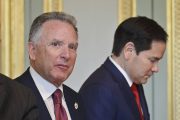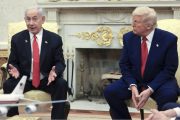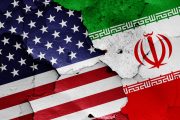
When President Barack Obama delivered the commencement address at West Point on May 22, he outlined a vision for an “international order” that would “resolve the challenges of our times” — from “stopping the spread of nuclear weapons and securing nuclear materials” to “combating a changing climate and sustaining global growth.”
But President Obama’s grandiose vision is not limited to countering threats. He also wants to extend “those universal rights that formed the creed of our founding” throughout the world. “Together with our friends and allies, America will always seek a world that extends these rights so that when an individual is being silenced, we aim to be her voice,” the President said at West Point. “Where ideas are suppressed, we provide space for open debate. Where democratic institutions take hold, we add a wind at their back. When humanitarian disaster strikes, we extend a hand. Where human dignity is denied, America opposes poverty and is a source of opportunity.”
America will accomplish all of this, not by acting alone, but by acting as part of the international community — that is, the emerging “international order.” In his West Point address, Obama called for strengthening “old alliances” while building “new partnerships” and shaping “stronger international standards and institutions.”
International standards would be meaningless without international enforcement, and Obama obviously views the U.S. military as not only carrying out its traditional role of providing for our national defense but also enforcing the collective dictates of the international order. “You, and all who wear America’s uniform, remain the cornerstone of our national defense, the anchor of global security,” Obama told the graduating class at the U.S. Military Academy.
He also said: “We fight to keep our families and communities safe. We fight for the security of our allies and partners, because America believes that we will be safer when our friends are safer; that we will be stronger when the world is more just.”
More just — but not perfect. Even Obama does not go so far as to claim that his envisioned international order could possibly eliminate all evil in the world. But that does not mean he does not want to try. According to Obama: “We understand that neither America nor any nation can dictate every outcome beyond its borders. We know that a world of mortal men and women will never be rid of oppression or evil. What we can do, what we must do, is work and reach and fight for the world that we seek — all of us, those in uniform and those who are not.”
Which means that we will be expending American blood and treasure to remake the world for a long time. Obama acknowledged in his commencement speech not only that “our campaign to disrupt, dismantle, and to defeat al Qaeda is part of an international effort” (emphasis added), but also that “this is a different kind of war. There will be no simple moment of surrender to mark the journey’s end — no armistice, no banner headline.”
The New York Times’ report on this speech, written by Peter Baker, claimed that Obama “essentially repudiated his predecessor’s emphasis on unilateral American power.” How so? President George W. Bush repeatedly stated his intent to enforce UN Security Council resolutions requiring Iraq to eliminate its reputed weapons of mass destruction. For instance, regarding Security Council Resolution 1441, Bush said in November 2002: “America will be making only one determination: is Iraq meeting the terms of the Security Council resolution or not?… If Iraq fails to fully comply, the United States and other nations will disarm Saddam Hussein.” The fact that Bush later launched an offensive war for this stated objective meant that he was more interested in enforcing UN Security Council resolutions than the UN Security Council was.
In September 2002, George W. Bush told the UN General Assembly:
The conduct of the Iraqi regime is a threat to the authority of the United Nations and a threat to peace. Iraq has answered a decade of U.N. demands with a decade of defiance. All the world now faces a test, and the United Nations a difficult and defining moment.
Are Security Council resolutions to be honored and enforced or cast aside without consequence?
Will the United Nations serve the purpose of its founding or will it be irrelevant?…
We want the United Nations to be effective and respectful and successful. We want the resolutions of the world’s most important multilateral body to be enforced. And right now those resolutions are being unilaterally subverted by the Iraqi regime.
Those are not the words of an American unilateralist. Those are the words of an internationalist who as President wanted to strengthen, not weaken, what the current occupant in the White House calls an “international order” — and what many other internationalists, including the first President Bush, have called a “new world order.” Rather than calling for something new, President Obama is actually championing the same basic foreign policy of his predecessors. And the grand design behind this policy is to strengthen the “international order” or “new world order” — world government, to put it bluntly — to the point where all nations including the United States will be subservient to its dictates.
Photo of Obama at West Point: AP Images




